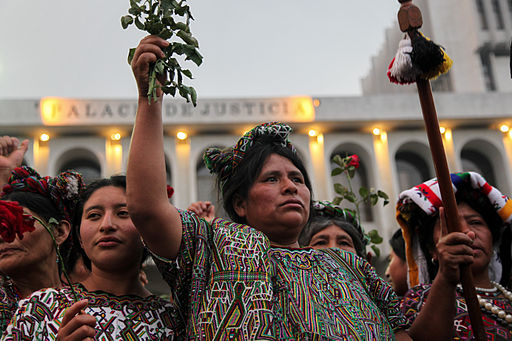Guatemala: Rios Montt retrial suspended
Former dictator Efrain Rios Montt’s retrial on charges of genocide and crimes against humanity was postponed, again, on January 5.
The following piece was published in the January-February 2015 NewsNotes.
Former dictator Efrain Rios Montt’s retrial on charges of genocide and crimes against humanity was postponed, again, on January 5. Presiding Judge Jeannette Valdez had initially rejected a motion that she recuse herself because she wrote a master’s thesis on genocide, calling the move “a strategy to obstruct” the proceedings. But the two other judges who make up the panel accepted the motion, causing the trial’s start to be postponed. A new tribunal will be named in the upcoming months for the trial to proceed.
The following is an excerpt from an article written by Jo-Marie Burt, director of Latin American Studies at George Mason University and Senior Fellow at the Washington Office on Latin America (WOLA). The original piece was published in December by the North American Congress on Latin America (NACLA) and is reprinted with her permission.
On May 10, 2013, a Guatemalan court found former dictator and army general José Efraín Ríos Montt guilty of genocide and crimes against humanity. It was an historic decision: the first time a former head of state had been prosecuted successfully in his native country for genocide, and the first time a high-level leader was convicted in Guatemala for the horrendous crimes that took place during that country’s 36-year civil war.
… The victims, members of the Maya Ixil community, rejoiced at the ruling. It was a vindication of their three-decade struggle to have their pain and suffering acknowledged, and those responsible punished.
However, under pressure by economic elites and sectors of the armed forces, the Constitutional Court undid the ruling just 10 days later, arguing a legal technicality. It set the trial back a month and thereby invalidated the verdict.
Domestic and international groups appealed to the Constitutional Court to overturn the ruling, arguing that the proper route to challenge the decision was through a normal appeal process, and that the majority opinion was flawed. Two judges wrote dissenting opinions substantiating these and other points. The Constitutional Court held fast to its decision.
In the meantime, the crusading attorney general who was the architect of the genocide case, Claudia Paz y Paz, was forced out of office early, and the presiding trial judge, Yassmín Barrios, has faced legal sanctions and media opprobrium.
…[O]n December 18, the Constitutional Court unanimously ruled that the decision of a pretrial judge, which argued that the proceedings should return to November 2011, prior to the date of Ríos Montt’s indictment, was illegal and should be nullified. That was the same ruling that, on April 18, 2013, dramatically halted the genocide trial in mid-process for the first time. The ruling vindicates the decision of trial court judge Yassmín Barrios, who at the time refused to acknowledge the legitimacy of that decision, deeming it clearly illegal.
But the amnesty question still remains a potential obstacle. During the 2013 proceedings, an appeals court rejected one of the many legal motions presented by Ríos Montt’s defense team calling for an earlier amnesty law to be applied. That amnesty law, passed in 1986 by then-dictator General Mejía Víctores with the intention of guaranteeing immunity from prosecution for all crimes committed during his government as well as that of his predecessor, Ríos Montt, in which he served as defense minister, was annulled. Another law, the National Reconciliation Law, allowed for amnesty for political crimes, but explicitly excluded international crimes of genocide, torture, and crimes against humanity. However, in one of several perplexing decisions, the Constitutional Court sent the ruling back to the appeals court, requesting that the decision be substantiated. While this may appear non-controversial, many observers feared that it leaves the door open for the appeals court to reverse its ruling and apply the 1986 amnesty law. …
International organizations … have published a statement calling on the appeals court to limit itself to following the Constitutional Court’s request to substantiate its decision that the amnesty law is not applicable. [The organizations] reminded the appeals court that both Guatemalan law and international law do not allow amnesty for international crimes, and that the Guatemalan state has the international obligation to investigate, prosecute, and punish grave violations of human rights. The same argument was put forth in an op-ed by Spanish Judge Baltazar Garzón, who also noted that if amnesty is applied in the Ríos Montt case, the trial could continue in a foreign court under the principle of universal jurisdiction. …
Photo: In May 2013, Maria Soto and other Ixil women celebrate after former Guatemalan dictator Rios Montt was found guilty of genocide against the indigenous Ixil people in the 1980s. Photographer: Elena Hermosa, for Trocaire from Ireland (Guatemala 4, GHR 16) [CC BY 2.0 (http://creativecommons.org/licenses/by/2.0)], via Wikimedia Commons)

